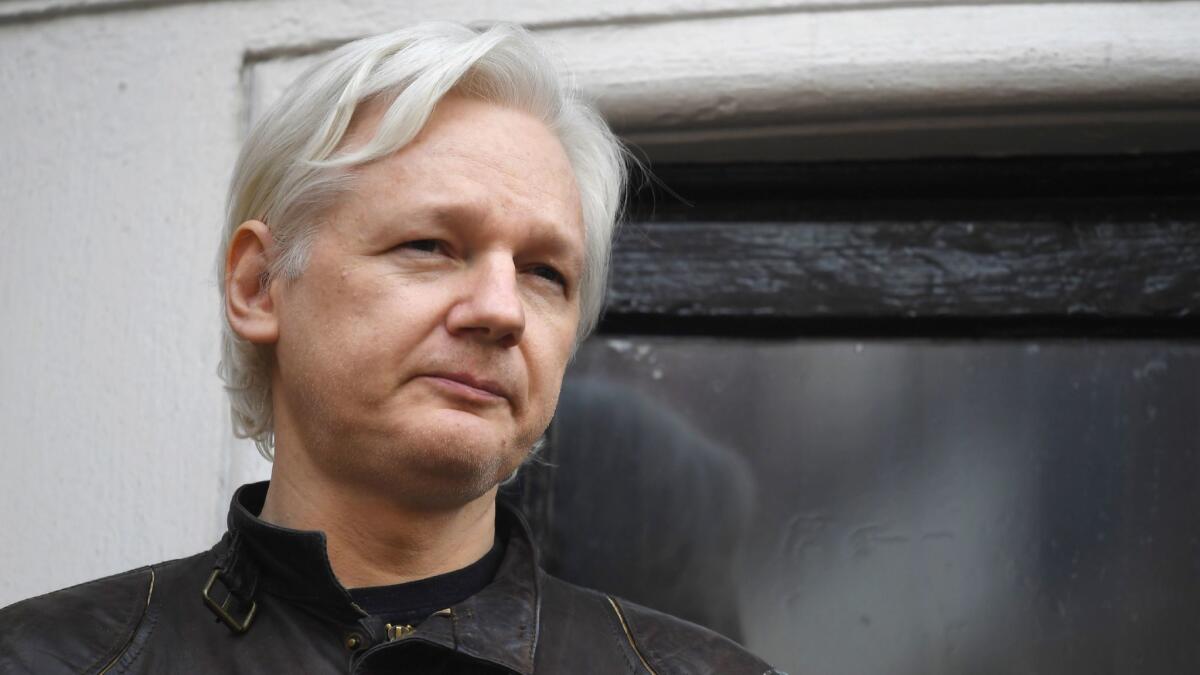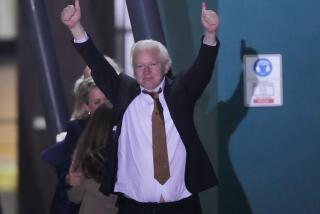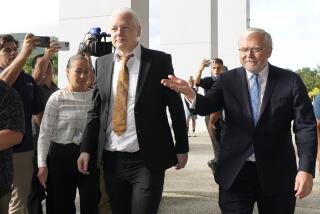Julian Assange has been charged, prosecutors reveal inadvertently in court filing

Reporting from Washington — WikiLeaks founder Julian Assange has been charged under seal, prosecutors inadvertently revealed in a recently unsealed court filing — a development that could significantly advance the probe into Russian interference in the 2016 election and have major implications for those who publish government secrets.
The disclosure came in a filing in a case unrelated to Assange. Assistant U.S. Atty. Kellen Dwyer, urging a judge to keep the matter sealed, wrote “due to the sophistication of the defendant and the publicity surrounding the case, no other procedure is likely to keep confidential the fact that Assange has been charged.” Later, Dwyer wrote the charges would “need to remain sealed until Assange is arrested.”
Dwyer is also assigned to the WikiLeaks case. People familiar with the matter said what Dwyer was disclosing was true, but unintentional.
Joshua Stueve, a spokesman for the U.S. Attorney’s Office in the Eastern District of Virginia, said, “The court filing was made in error. That was not the intended name for this filing.”
An FBI spokeswoman declined to comment.
Federal prosecutors in the Eastern District of Virginia have long been investigating Assange, and in the Trump administration had begun taking a second look at whether to charge members of the WikiLeaks organization for the 2010 leak of diplomatic cables and military documents which the anti-secrecy group published. Investigators also had explored whether WikiLeaks could face criminal liability for the more recent revelation of sensitive CIA cyber-tools.
Special counsel Robert Mueller III has also exploring the publication by WikiLeaks of emails from the Democratic National Committee and the account of Hillary Clinton campaign chairman John Podesta. Officials have alleged the emails were hacked by Russian spies and transferred to WikiLeaks.
Mueller has also been exploring, among other things, communications between the group and associates of President Trump, including political operative Roger Stone and commentator and conspiracy theorist Jerome Corsi.
In July, his office charged 12 Russian military spies with conspiring to hack DNC computers, steal the organization’s data and publish the files in an effort to disrupt the election and referred in an indictment to WikiLeaks, described only as “Organization 1,” as the platform the Russians used to release the stolen emails.
A spokesman for the special counsel’s office declined to comment.
It was not immediately clear what charges Assange would face. In the past, prosecutors had contemplated pursuing a case involving conspiracy, theft of government property or violating the Espionage Act. But whether to charge the WikiLeaks founder was hardly a foregone conclusion. In the Obama administration, the Justice Department had concluded that pursuing Assange would be akin to prosecuting a news organization. Former Attorney General Jeff Sessions, though, had taken a more aggressive stance and vowed to crack down on all government leaks.
Barry Pollack, one of Assange’s attorneys, said, “The only thing more irresponsible than charging a person for publishing truthful information would be to put in a public filing information that clearly was not intended for the public and without any notice to Mr. Assange. Obviously, I have no idea if he has actually been charged or for what, but the notion that the federal criminal charges could be brought based on the publication of truthful information is an incredibly dangerous precedent to set.”
The filing in the Eastern District of Virginia came Aug. 22, in a case that combines national security and sex trafficking. Seitu Sulayman Kokayi, 29, was charged with enticing a 15-year-old girl to have sex with him and send him pornographic images of herself. But he was detained in part, according to the court filing, because he “has a substantial interest in terrorist acts.”
His father-in-law, according to the filing, has been convicted of terrorist acts. The case involves previously classified information, according to government filings, and prosecutors plan to use information obtained under the Foreign Intelligence Surveillance Act. Kokayi was indicted last week and is set to be arraigned Friday morning.
The case had been sealed until early September, though by itself it attracted little notice. On Thursday evening, Seamus Hughes, the deputy director of the Program on Extremism at George Washington University who is known for scrubbing court filings, joked about the apparent error on Twitter — which first brought it to the attention of reporters.
Even if he is charged, Assange’s coming to the United States to face trial is no sure thing. Since June 2012, Assange has been living in the Ecuadorian embassy, afraid that if he steps outside he will be arrested.
When he first sought asylum in the embassy, he was facing possible extradition to Sweden in a sex crimes case. He has argued that case was a pretext for what he predicted would be his arrest and extradition to the United States.
In the years since, the Swedish case has been closed, but Assange has said he cannot risk leaving the embassy because the U.S. would attempt to have him arrested and extradited for disclosures of U.S. government secrets. Throughout that time, the U.S. has refused to say whether there are any sealed charges against Assange.
If Assange were to leave the embassy and be arrested by British authorities, he would likely still fight extradition in the British courts.
Zapotosky and Barrett write for the Washington Post. The Post’s Rachel Weiner and Ellen Nakashima contributed to this report.
More to Read
Sign up for Essential California
The most important California stories and recommendations in your inbox every morning.
You may occasionally receive promotional content from the Los Angeles Times.










